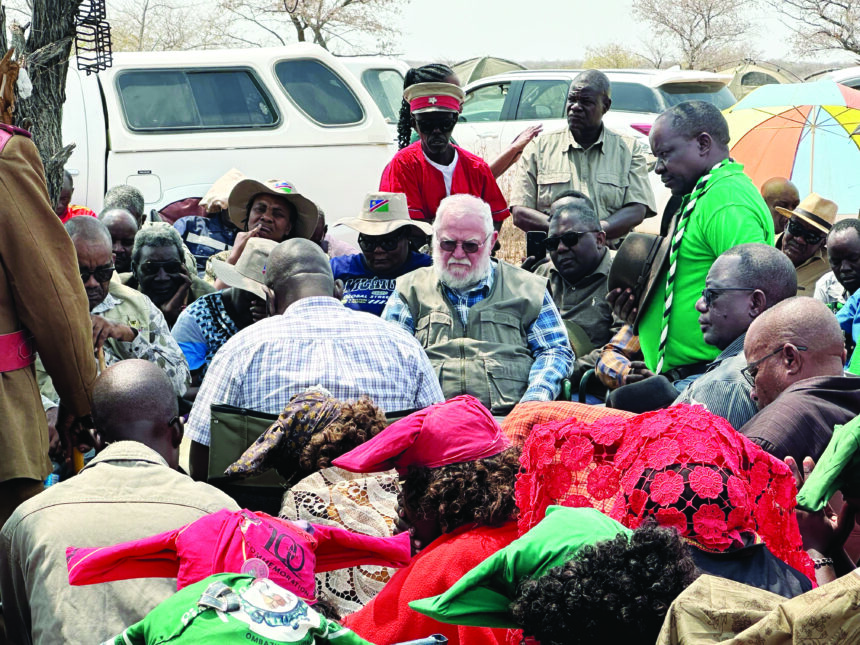Charles Tjatindi
GAM – Government has been encouraged to ensure that the 49 repatriated households from Botswana are assisted to become self-sufficient.
The returnees will be allocated residential plots on a piece of land cleared for their reception outside Gam in the Otjozondjupa region.
The land, located some two kilometres outside Gam, is solely reserved for the returnees, including the ones to come in the next round.
It is planned that the piece of land will eventually become an extension of the Gam settlement, which itself started out as a reception centre for returning Namibians who made their way back to Namibia from Botswana between 1992 and 1996.
Their arrival has sparked interest, with traditional and political leaders making the trek to Gam to welcome the
returnees.
Evalistus Kaaronda, a Swanu faction leader, called on the government to ensure these returnees are self-sufficient, as opposed to relying on handouts.
Welcoming the returnees to the site on Saturday, land reform minister Calle Schlettwein pledged the government’s support to them, noting that all vital services will be allocated to make their stay at the reception site comfortable.
He said the area, which has already been fenced around its perimeter for the safety and comfort of the returnees and their belongings, will be provided with some form of electricity soon.
The minister informed the returnees that the government will take care of their basic needs for food, sanitation and water provision while at the reception centre. Food rations currently being provided per household are, however, only to allow them to ease in, and the process will be reviewed after three months.
Schlettwein encouraged the group to already put in their applications for all social amenities the government provides, such as old-age pensions, as well as disability and welfare grants, to make their stay in the country welcoming.
Home
“You are Namibians. You are back in the land of your ancestors. We will do all we can to make your integration as comfortable as possible, hence all these services that we will be providing for you at this reception centre. However, we also encourage you to make use of all government grants and benefits available to your disposal as Namibians to improve your livelihoods,” he reiterated.
Schlettwein noted that special arrangements have been made with the relevant ministries and government agencies to allow the returnees to easily apply for all services they need, such as citizenship documents and placement of children in schools in the vicinity.
Also, for those who intend to venture into commercial farming, a window of opportunity exists as the government has allocated five newly-purchased farms with a combined 23 000 hectares of land to be used for resettlement.
Schlettwein said the returnees will be given preference to be resettled on these farms, but encouraged them to apply through the relevant channels. For those who do not intend to farm commercially but want to venture into communal farming, arrangements have already been made in that regard, he added.
“There is an area near the village of Otjipaheua in the Tsumkwe/Gam area which has been cleared for this purpose. A borehole has already been drilled there, and we are more than willing to facilitate your relocation there to practice farming as per your wish,” he added.
In total, 98 Namibians returned to the country of their ancestors on Friday.
Reaction
Reacting to the repatriation, Namibia’s oldest political movement Swanu poked holes in the government works, noting that more needs to be done to fully integrate the people into society.
Speaking to Nampa on the sidelines of the official ceremony to welcome the returning Namibians, Kaaronda said his party is worried that the returnees are merely being transplanted into Namibia, instead of being allowed to fully integrate. He said the return of the Namibians to the country of their ancestors is already filled with uncertainty on the side of the returnees for their future; claiming proper absorption is needed to avoid them feeling like outcasts.
Kaaronda thanked the government for prioritising the provision of basic services to the community of returnees at their reception centre, but said more needed to be done. His party was particularly concerned about how long it would take for the returnees to stand on their own two feet, following the repatriation, and when the government’s initial reception benefits’ phase is completed.
“We welcome them home, and hope they will have a better life here. It is the land they always dreamed of coming back to, and we are glad they are home. But one wonders what exactly it is that they will be coming home to, and at what cost? Surely, more needs to be done to fully integrate them,” he noted.
Kaaronda furthermore called on the government to consider awarding tourism concession rights, fishing quotas and other forms of rights which will make them self-sufficient, and not rely on handouts.
“We have said it time and time again that handouts do not work, especially food. People do not really want those; they want to be self-sufficient so that they do not have to rely on others or the government forever. Let’s look into that,” he urged.



